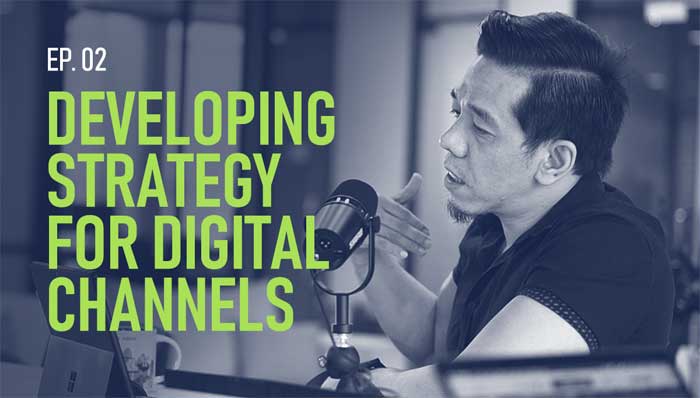How to Create A Digital Marketing Budget Plan That Actually Works

When business gets tight, marketing is often the first budget to shrink. It sounds practical, until you realize it’s also one of the fastest ways to fall behind.
In today’s digital-first market, cutting back on marketing doesn’t just slow your growth. But it actually silences your brand while everyone else is still talking. And they’re not just talking; they’re spending.
Digital ad spend in the Philippines continues to rise year after year. Businesses are investing more in search, video, and social ads because that’s where their customers are. In fact, digital now accounts for more than half of most companies’ marketing budgets.
So if competitors are making the effort to stay visible online, the real question is, why shouldn’t you?
But before you throw money at campaigns and tools, you need to make sure every peso in your digital marketing budget has a purpose. Creating a smart digital marketing budget plan isn’t about spending more; it’s about spending right.
Why Having a Marketing Budget Matters for Every Business
Running campaigns without a budget plan is like grocery shopping hungry, everything suddenly feels like a good idea.
A marketing budget gives direction to your strategy. It tells you what you can do, where you can win, and when to pivot. Without one, you’ll likely spend more on what looks good, not what works.
Here’s the reality: Filipino consumers spend nearly 11 hours a day online, that’s almost half our waking hours scrolling, shopping, and searching. And digital ads aren’t slowing down anytime soon. As more brands compete for attention, cost-per-click goes up, and standing out takes both creativity and strategy.
When you set and follow a budget, you’re not limiting your growth, you’re actually protecting it. You’re making sure your marketing spend aligns with your business goals and delivers measurable results instead of guesswork.
What to Consider Before You Allocate Budget for Digital Marketing
Hang on. Before you calculate numbers, you need to identify where your money actually makes sense. Learning how to allocate budget for digital marketing starts with knowing your goals, reviewing past performance, and aligning spend with your business’s revenue, and not just gut feel.
What are Your Marketing Objectives
The most important question before spending is: what exactly are you trying to achieve?
If your goal is to increase leads this quarter, your strategies might include SEO (to improve visibility) and content marketing (to attract and nurture audiences). If your goal is retention, you might prioritize email campaigns or remarketing.
Aligning your objectives with your budget ensures every peso spent has a role in hitting your targets.
Think of it this way: if your goal is to generate leads but all your money goes to brand awareness, that’s like buying a gym membership and never touching the treadmill. You’re showing up, but you’re not getting results.
Defining objectives also makes it easier to track ROI. You’ll know what success looks like, and what it costs to get there.
What Worked in Your Previous Campaigns?
Determining how much to spend isn’t just about looking forward, but it’s also about looking back.
Analyze your previous strategies to see which ones delivered and which ones didn’t. And then ask:
By looking at your own performance data, you can identify which channels deserve more funding and which ones might need a break.
For example, if your SEO campaign consistently generates organic leads at a lower cost than paid ads, that’s a signal to double down on SEO. Conversely, if an expensive social campaign barely moved your numbers, maybe it’s time to redirect those funds.
Tip: Do a quarterly review of your marketing performance. Especially for SEO and content marketing. Results take time, comparing quarterly data helps you catch momentum and adjust early before you overspend on slow channels.
How Much Can You Realistically Spend?
Now let’s talk about numbers.
Your total marketing budget should always be tied to your business’s revenue, not wishful thinking.
According to The CMO Survey, B2B Product companies allocate an average of 7.9% of their total revenue to marketing. In contrast, B2C Product companies tend to invest significantly more, allocating roughly double that amount, or about 15.8% of their revenue, with actual spend varying based on competition and specific growth goals.
The point isn’t to copy these numbers blindly. It’s to find a balance between what’s sustainable and what drives measurable results.
If your marketing goal is aggressive growth, your budget should reflect that ambition. But if you’re maintaining momentum, you can be more conservative, just don’t zero it out entirely.
Remember: marketing isn’t an expense; it’s an investment. It funds visibility, brand credibility, and the steady flow of customers that keep your business alive.
How to Create a Digital Marketing Budget Plan
Once you’ve set your goals and know where to stand, it’s time to put numbers behind your plans. A digital marketing budget plan isn’t about guessing, it’s about structuring your spend so that each peso has a clear purpose.
Most businesses find it helpful to break their budget into three main areas: expertise, tools, and acquisition. These represent the people, the platforms, and the performance you’re paying for.
What Costs Should be in Your Digital Marketing Budget?
1. Cost of Expertise
You can either build an in-house marketing team or outsource the work to an agency. Both options have costs, they just look different.
If you go in-house, you’re paying for time, talent, and the learning curve. Tracking how long tasks take (and what each hour costs) helps you estimate the real value of in-house work.
If you outsource, you’re paying for experience/ agencies already have the systems, tools, and strategies in place to deliver results faster, and often more efficiently.
Whether you hire internally or bring digital marketing experts, remember: expertise costs money, but so does inexperience.
2. Cost of Digital Marketing Tools
Digital marketing runs on data and automation, and that means tools. From analytics to keyword research to email marketing, every function has software to make your life easier.
Free tools like Google Analytics and Search Console are a good starting point, but most growing businesses eventually invest in premium platforms for deeper insights. The key is to know which tools your strategy actually needs. Paying for every shiny dashboard isn;’t a strategy, it’s just clutter.
If you work with an agency, tools costs are usually baked into their fees, saving you from maintaining multiple subscriptions on your own.
3. Cost of Acquisition
This is where your marketing spend meets your business goals.
Your Cost Per Acquisition (CPA) tells you how much it costs to gain one new customer. It’s one of the simplest, most powerful metrics in your entire budget plan.
Here’s a quick refresher:
If you spent ₱20,000 and gained 200 customers (not leads), your CPA is ₱100. That means it costs you ₱100 to acquire one paying customer. Be very careful of knowing the difference between your Cost Per Lead versus your Cost Per Acquisition.
Now, if you want to double your customer base, you’ll need to double that budget—unless you improve efficiency through better targeting, creative, or channel mix.
Knowing your CPA helps you set realistic growth goals and measure how efficiently your campaigns convert spend into sales.
Tip: Track your CPA for each channel—SEO, paid ads, email, social—instead of one lump sum. That way, you’ll know which channels give you the most return per peso and which ones may need a rethink.
Where to Spend Your Digital Marketing Budget Wisely
You don’t need a massive budget to see results, you need a smart one.
A well-structured digital marketing budget prioritizes the channels that deliver the highest ROI and long-term growth potential.
Here’s where most business get the most bang for their buck:
Digital Marketing Strategies That Deliver the Best ROI
SEO and Content Marketing
Still undefeated for long-term ROI. Optimizing your site and creating valuable content means your investment keeps working even after the campaign ends. Blog posts, product pages, and guides can continue to drive organic traffic months—even years—after publication.
Paid Search and Social Advertising
These channels deliver instant visibility but require constant optimization. With ad costs continuing to rise, it’s crucial to monitor cost-per-click and conversion rates closely. Use paid ads strategically, to boost new launches, promote key offers, or retarget high-intent audiences.
Email Marketing and Automation
Automation tools help you do more with less. Recent industry reports revealed that 70% of marketers now use automation to handle repetitive tasks and improve efficiency. With the right setup, email can nurture leads, increase retention, and reduce manual efforts, all without inflating costs.
Analytics and Reporting
You can’t fix what you don’t measure. Investing in reporting tools and dashboards helps you understand what’s working and what’s not. Businesses that track ROI regularly are significantly more likely to secure budget increases.
Should you Invest in Tools and Data Analytics?
Short answer? Yes—if you want your budget to work smarter, not harder.
Although data isn’t perfect, it still gives you valuable direction. Analytics tools, CRM systems, and first-party data collection provide the clarity you need to understand performance and audience behaviour, even if the numbers don’t always tell the full story.
And with the gradual phase-out of third-party cookies, collecting and managing your own data has never been more important. It’s not just about privacy compliance, but it’s about control. First-party data lets you build more personalized campaigns and optimize spend across every channel.
Think of data as your financial compass. Without it, you’re not budgeting, you’re guessing.
How Can You Stretch Your Budget Further?
Repurpose and Refresh Your Content
Creating new content from scratch every time is expensive. Instead, rework what you already have. That webinar? Turn it into three short videos, a blog post, and a few bite-sized social snippets. Suddenly, one campaign becomes five touchpoints.
Automate Smartly
Use automation to handle repetitive tasks like follow-up, lead scoring, and social scheduling. It saves time, reduces errors, and lets your team focus on strategy instead of maintenance.
Review and Adjust Regularly
Budgets shouldn’t be static. Check your numbers quarterly, look at ROI, CPA, and engagement metrics. If something’s underperforming, reallocate early. Don’t wait until you’ve burned through your budget to make changes.
Remember: the smartest marketers don’t always spend the most—they just spend with intention.
The Smartest Spend Is the One That Drives Growth
A solid digital marketing budget plan doesn’t restrict you. Rather, it refines you. It shows you where to double down, where to pivot, and where to stop guessing.
Define your goals, trust your data (even when it’s not perfect), and keep your focus on outcomes, not outputs.
Because smart marketing isn’t about how big your budget is. It’s about how boldly you use it.










